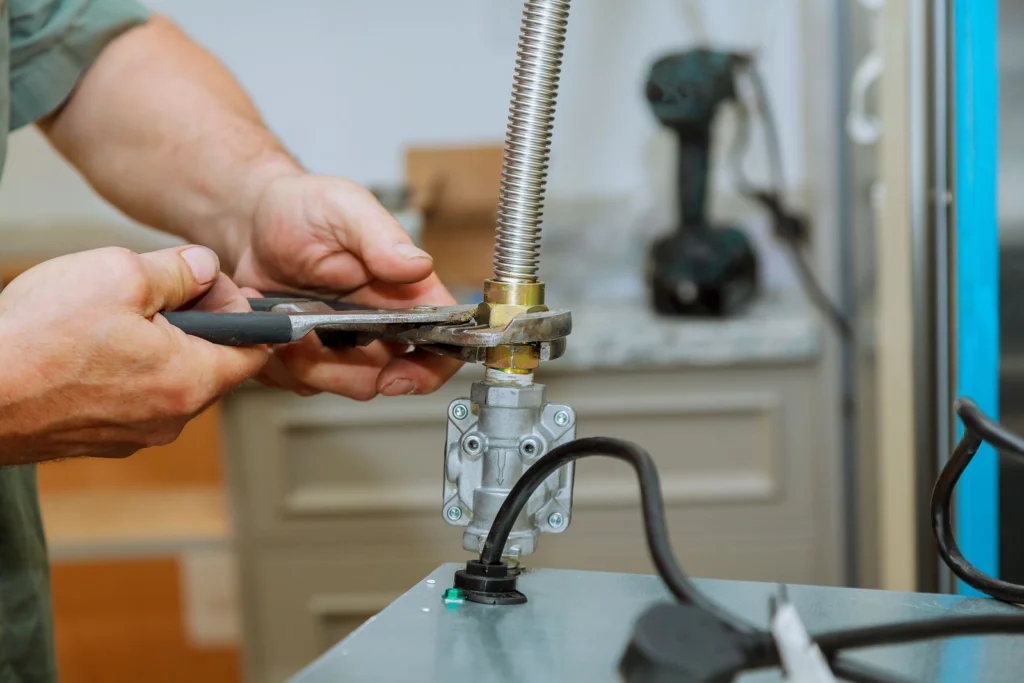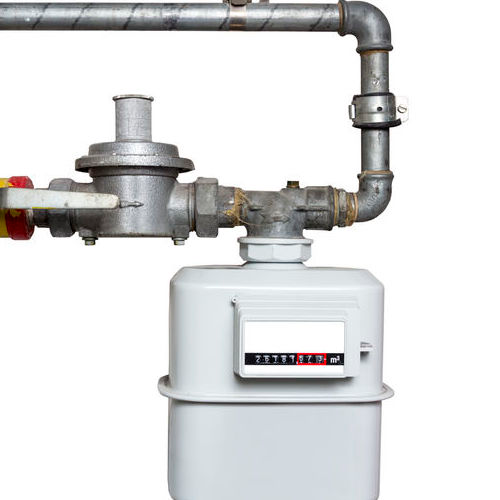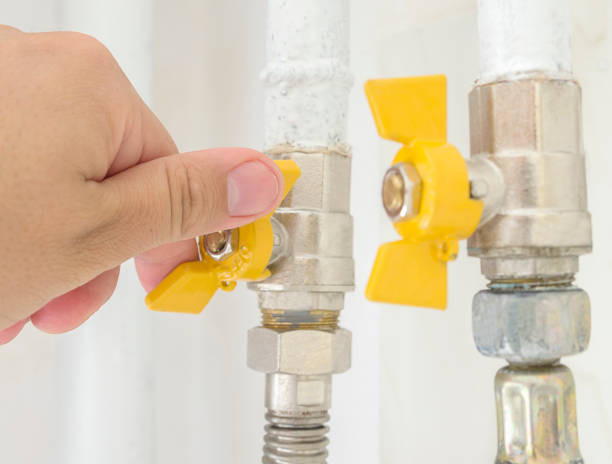What is Gas line?
Professional Gas Line Services You Can Trust
Whether you’re installing a new appliance, upgrading your home, or addressing a safety concern, professional gas line services are essential for keeping your property safe and energy-efficient. Our team of licensed and experienced technicians is here to provide reliable gas line installation, repair, and maintenance solutions tailored to your needs.

Why Gas Line Installation and Maintenance Matter
Safety First: Faulty or damaged gas lines can lead to dangerous leaks, fires, or carbon monoxide exposure. Regular inspections help prevent hazards.
Efficiency: A properly installed gas line ensures consistent gas flow, improving appliance performance and energy efficiency.
Code Compliance: Gas line work must meet local building and safety codes, often requiring licensed professionals.
How Do Gas Lines Work?
Gas lines transport natural gas or propane from your utility’s main supply to your appliances through a network of pipes. The gas flows under pressure through the lines, regulated by valves and meters, to ensure the right amount reaches each appliance safely. When you turn on a gas stove or heater, the valve opens, allowing gas to flow and ignite the burner or pilot light.
The gas pressure is carefully controlled by regulators to match the needs of different appliances, ensuring safety and optimal performance. Inside the home or building, the gas line system is connected to various appliances such as furnaces, water heaters, ovens, fireplaces, and outdoor grills.
Gas lines are typically made of durable materials like steel, copper, or flexible polyethylene, designed to withstand pressure and resist corrosion. Modern systems also include safety features such as shut-off valves and leak detectors that automatically stop gas flow if a leak is detected.


Benefits of Having a Properly Installed Gas Line
Reliable Energy Supply: Gas lines provide a steady, uninterrupted source of energy for heating, cooking, and hot water.
Cost-Effective: Natural gas is often cheaper than electricity, helping reduce utility bills.
Environmentally Friendly: Gas burns cleaner than coal or oil, producing fewer pollutants and greenhouse gases.
Convenience: Instant heat and precise temperature control for appliances.
Increased Property Value: Homes with gas lines and appliances are attractive to buyers due to energy savings and performance.
Versatility: Supports a wide range of appliances—from HVAC systems to outdoor grills and fireplaces.
How to Choose the Right Gas Line Service Provider
Licensing and Certification: Always select a licensed and insured professional certified to work with gas lines.
Experience: Look for technicians with proven experience and positive reviews in gas line installation and repair.
Safety Focus: The company should prioritize safety, performing thorough leak tests and following code requirements.
Transparent Pricing: Request clear estimates with no hidden fees.
Customer Support: Responsive communication and after-service support matter in emergencies.
Emergency Services: Choose a provider offering 24/7 emergency repair services.
Warranty: Check if the work and materials come with a warranty for peace of mind.
Gas Line Safety and Compliance
Keep Your Gas Lines Safe with Regular Inspections
Gas lines are a critical component of your home or business, but they can pose serious risks if not properly installed or maintained. A small leak can lead to fire hazards, explosions, or carbon monoxide poisoning. That’s why it’s essential to work with licensed professionals who follow strict safety standards and local building codes.
Regular inspections and timely repairs help ensure your gas system operates safely and efficiently, giving you peace of mind.
Building a Safer Home with Quality Gas Line Installation
Proper installation of gas lines is not just about connecting pipes—it involves careful planning, precise workmanship, and compliance with regulations. When installed by experienced technicians, gas lines can provide a safe, long-lasting fuel source for appliances like stoves, heaters, and outdoor grills.
A professionally installed system minimizes the risk of leaks, reduces maintenance costs, and improves overall performance, ensuring reliable energy delivery for years to come.
Gas Line Installation & Emergency Repair
Safe, Certified Installation & Repair You Can Trust
Whether you’re installing a new gas appliance or need emergency repair, gas line work demands precision, experience, and full compliance with safety codes. At High Class, we provide licensed gas line installation, repair, and inspection services for residential and light commercial properties.
Trusted Gas Line Installation
Our team installs gas piping for:
Furnaces & Boilers
Water Heaters (Tank & Tankless)
Stoves, Ovens, and Cooktops
Fireplaces & Outdoor Gas Features (BBQs, fire pits, patio heaters)
Clothes Dryers and Garage Heaters
Backup Generators
Our Process
Consultation & Planning
We assess appliance location, gas demand, and local codes to design a safe, efficient gas line layout.
Material Selection
We use CSA-approved materials such as corrugated stainless steel tubing (CSST), black iron pipe, or flexible gas connectors—depending on your setup and code requirements.
Code-Compliant Installation
Every gas line is installed following local and national codes, including proper sizing, ventilation, and support.
Pressure Testing & Inspection
Before activation, we conduct a full pressure/leak test and coordinate necessary permits and inspections for full compliance.
Appliance Hook-Up & Start-Up
We connect your gas appliance, perform final leak checks, and ensure proper ignition and operation.
Gas Line Repair & Leak Response
Gas leaks are dangerous and should be addressed immediately. Our certified technicians are equipped to:
Locate and repair gas line leaks using advanced detection equipment
Replace corroded or damaged gas pipes
Fix poor connections or failed fittings
Restore gas service following a shutoff or red-tag from your utility provider
Perform emergency shutdown and system isolation when required
Signs You May Have a Gas Leak:
Rotten egg or sulfur-like odor
Hissing sound near a gas line
Headaches, dizziness, or nausea indoors
Dead vegetation near underground lines
Annual Inspections & Maintenance
Preventative gas line maintenance is essential for safety and longevity. Our annual inspection services include:
Leak detection using pressure testing and sensor tools
Checking flexible connectors and shutoff valves
Verifying pipe integrity and support brackets
Inspecting outdoor gas lines for corrosion or weather damage
Why Hire a Licensed Gas Technician?
Improper gas line work can lead to leaks, fires, carbon monoxide poisoning, or fines for code violations. Our team is:
Fully licensed and insured
Experienced in residential and commercial gas systems
Trained in current building and gas safety codes
Committed to clean, secure, and professional installations
From new appliance hookups to urgent leak repairs, trust High Class for safe, code-compliant gas line services.
Contact us today to schedule your consultation or emergency visit.
Safety & Compliance Standards
Safety is non-negotiable. All heating and cooling installations and repairs are performed in accordance with the latest codes and safety protocols:
Technician Certification: All installers are licensed, insured, and trained in WHMIS, fall protection, lockout/tagout, and confined space entry .
Job Site Safety Checks: Before work begins, a hazard assessment is completed and shared with the crew.
Proper Handling of Refrigerants: Technicians are certified to recover and handle refrigerants responsibly (EPA 608 or equivalent in your region).
Gas Line & Combustion Safety: Gas appliances are pressure-tested and properly vented to prevent CO risks.
FAQs
What should I do if I smell gas but can’t find the source?
Gas lines can supply fuel to a wide variety of appliances including stoves, ovens, water heaters, furnaces, fireplaces, dryers, and outdoor grills. Our technicians ensure proper and safe connections tailored to your specific appliances.
How long does a typical gas line installation take?
The duration of gas line installation varies based on the complexity and size of the job, but most residential installations are completed within a few hours to a day. Our team provides an estimated timeline during the consultation and keeps you informed throughout the process.
What types of appliances can be connected to gas lines?
Gas lines can supply fuel to a wide variety of appliances including stoves, ovens, water heaters, furnaces, fireplaces, dryers, and outdoor grills. Our technicians ensure proper and safe connections tailored to your specific appliances.
Testimonials
Honest Reviews from our Customers

Jane Anderson
Homeowner, San Diego
Ready to transform your outdoor space?
Contact us today to schedule a consultation or to learn more about our services.

